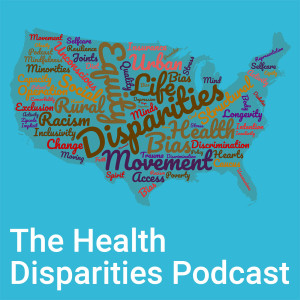The Health Disparities Podcast
The Health Disparities Podcast is the world’s leading health equity discussion forum and is a program of Movement is Life. This podcast features thought leaders in the world of equitable health, and highlights health disparities, social determinants of health and community-led solutions.
Episodes

Wednesday Mar 25, 2020
Wednesday Mar 25, 2020
Nobody can ignore the COVID-19 pandemic. But will some communities be hit harder than others? What are the implications for people with diabetes and obesity? Will everyone be able to access care if they need it?

Wednesday Mar 25, 2020
Wednesday Mar 25, 2020
Fatima Cody Stanford, MD, MPH, MPA, FAAP, FACP, FTOS is an obesity medicine physician scientist, educator, and policy maker at Massachusetts General Hospital and Harvard Medical School. She is a national and international sought-after expert in obesity medicine who bridges the intersection of medicine, public health, policy, and disparities.

Wednesday Mar 11, 2020
Wednesday Mar 11, 2020
Fixing the incredible dysfunction of the healthcare system has been a career guiding light for Adrienne White-Faines, MPA, FACHE. Since electing to stay on the policy and strategy side of healthcare, she has held leadership roles with the American Cancer Society, the Primary Care Collaborative, and most recently as CEO of the American Osteopathic Association.

Friday Feb 21, 2020
Friday Feb 21, 2020
Known by most as simply “Father Greg”, Father Gregory Boyle founded Homeboy Industries, Inc. in Los Angeles to provide pathways out of violence through education, employment and community support.

Friday Feb 07, 2020
Friday Feb 07, 2020
This year’s Vanguard Award winner is Dr. Patricia McManus, founder of the Black Health Coalition of Wisconsin (BHCW).

Friday Jan 24, 2020
Friday Jan 24, 2020
Orthopedic surgeon Tamara Huff, MD was inspired by her mothers’ interest in carpentry (and her power tool collection) to take her medical career path, ultimately leading to the operating room.

Friday Jan 10, 2020
Friday Jan 10, 2020
Although fee-for-service payments may encourage volume without rewarding quality, bundled payments may incentivize providers to avoid patients more prone to complications...

Friday Dec 27, 2019
Friday Dec 27, 2019
In some faith-based communities there has been an evolving sense of what constitutes transformation and salvation. Harlem native Rev. Willis Steele discusses the health needs of the congregations and communities he works with, his experience of integrating health into faith practice, and how mental health support can be complementary to spirituality. Rev. Steele also describes an inter-generational initiative helping aspiring “silver surfers” cross the digital divide by accessing online health information and reducing disparities. With Rolf Taylor.

Friday Dec 13, 2019
Friday Dec 13, 2019
Yale hip and knee surgeon Daniel Wiznia, MD, used a “secret shopper” methodology to research and reveal patterns of appointment making that seem to indicate a marked preference for commercial insurance on the part of some surgery providers, which creates a barrier to access for Medicare and Medicaid patients. Is this a negative consequence of the bundled payments ushered in by the ACA reforms, and can risk-adjustments help solve the problem? With Bill Finerfrock.

Friday Nov 29, 2019
Friday Nov 29, 2019
Working in Wyoming where there are only two humans per square mile (on average), nurse practitioner Mary Behrens, MS, FNP-BC, FAANP provides vital health care capacity to mainly rural populations. In this podcast she describes the role of the nurse practitioner, a discipline that is growing rapidly. She also discussed some of the ways a nurse practitioner can help reduce health disparities – from recognizing the unique and complex needs of patients with comorbidities, to facilitating physical therapy and physical activity. With Rose Gonzalez.






